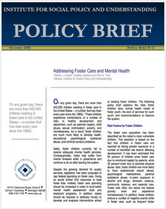
Addressing Foster Care and Mental Health
On any given day, there are more than 542,000 children residing in foster care in the United States—a number that has risen every year since the 1980s.1 These children experience combinations of a number of risks to healthy development and adjustment, such as parental neglect, child abuse, sexual victimization, poverty, and homelessness. As a result, foster children are much more likely to develop health, educational, psychological, substance abuse, and criminal conduct problems.
Sadly, foster children currently fail to receive adequate mental health services. Consequentially, foster kids suffer from mental illnesses while in placements and continue to do so after leaving the system.
Despite the growing demand for quality services, legislation has been proposed to cap federal spending on foster care. Doing so would further limit resources to treat foster kids. Instead, foster care spending should be increased in order to fund better mental health assessment tools and treatment programs. In addition, states should be required to dedicate money to develop and evaluate interventions aimed at treating foster children. The following policy brief explains the risks foster children face, mental health needs of foster youth, the lack of services for such youth, and recommendations to improve the system.


